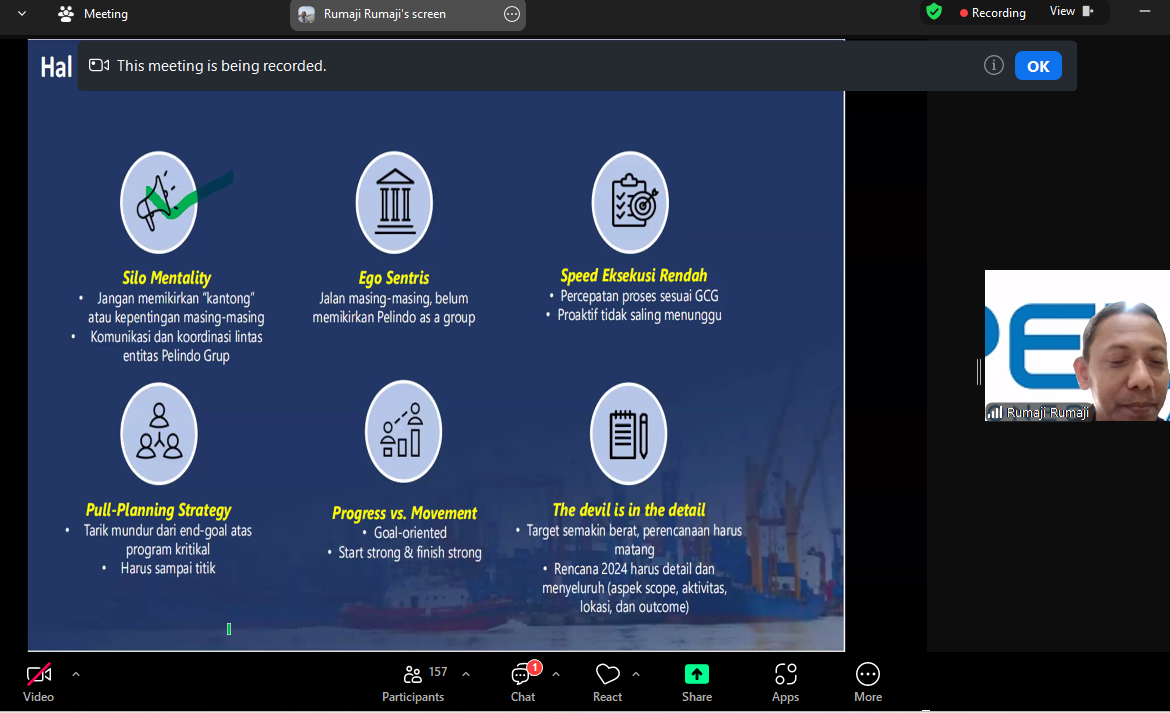
Practitioner Lecture in Leadership Highlights Managing Transformational Changes: Roles and Challenges for Leaders
The Undergraduate Management Study Program, Faculty of Economics and Business (FEB), Universitas Sebelas Maret (UNS) hosted a Practitioner Lecture in Leadership taking on the theme “Managing Transformational Changes: What Leader’s Roles and Challenges?” The online session took place on Thursday, October 17, 2024, and was attended by over 100 participants. The session featured Dr. Rumaji, S.Sos., M.Sc., Department Head of Internal Oversight at PT Pelindo (Persero), as the keynote speaker.
In his presentation, Dr. Rumaji emphasized that organizations undertaking transformation need to consider numerous critical aspects. He highlighted that transformation must be thorough, well-structured, and systematic to mitigate the significant risks of failure associated with it.
 “Many companies face challenges in achieving successful transformation. Data from various sources suggest that 70% to 80% of companies attempting transformation do not achieve their intended goals. In this context, leadership plays a crucial role, requiring leaders who are fully committed to the process,” Dr. Rumaji explained.
“Many companies face challenges in achieving successful transformation. Data from various sources suggest that 70% to 80% of companies attempting transformation do not achieve their intended goals. In this context, leadership plays a crucial role, requiring leaders who are fully committed to the process,” Dr. Rumaji explained.
He outlined several factors contributing to unsuccessful transformations, where the first is due to an ‘Unclear Transformation Strategy.’ Transformations often fail due to poorly defined strategies. Clear goals must be set, outlining the purpose, scope, and key areas for transformation—whether in human resources, marketing, corporate strategy, or other sectors. A detailed approach considering strategic factors is essential.
Secondly, transformations that are merely cosmetic or symbolic often fail to address underlying issues. Dr. Rumaji stressed that focusing only on surface-level activities, without resolving core problems, renders the transformation ineffective. Effective transformation should target the root causes to ensure meaningful and efficient change.
The third affecting factor is due to Undefined Starting Position, where lack of clarity on the company’s current positioning, such as whether it is a market leader, follower, or in an intermediary role, often leads to failure. Without a clear understanding of its starting point, an organization cannot set appropriate transformation goals.
 And lastly, transformations are often unsuccessful when carried out in a fragmented manner. Companies may focus on specific areas without integrating efforts across departments. Additionally, the varying capabilities of human resources must be addressed to ensure alignment throughout the organization.
And lastly, transformations are often unsuccessful when carried out in a fragmented manner. Companies may focus on specific areas without integrating efforts across departments. Additionally, the varying capabilities of human resources must be addressed to ensure alignment throughout the organization.
Drawing from his experience, Dr. Rumaji shared insights from Pelindo’s transformation, initiated on October 1, 2021. Over the past three years, Pelindo has navigated the complexities of corporate and business transformation, which remain a dynamic and challenging process.
Through the lecture, participants gained a deeper understanding of the roles and challenges leaders face during transformational changes, along with practical insights from real-world applications. The session provided valuable perspectives for aspiring leaders preparing to guide organizations through significant changes.

